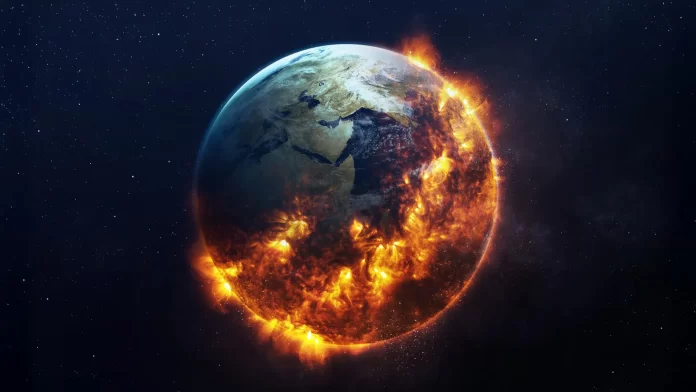In a recently released report, a team of international climate scientists warns that saving many tropical coral reefs from destruction caused by rising ocean temperatures will now require extraordinary effort. The researchers also conclude that some regions of the polar ice sheets may have already crossed their tipping points. If this melting continues, it could cause irreversible sea level rise measured in several meters.
Scientists Warn of Cascading Climate System Failures
Among the lead authors of the Global Tipping Points Report 2025 (GTPR 2025) is Nico Wunderling, Professor of Computational Earth System Sciences at Goethe University’s Center for Critical Computational Studies | C3S and researcher at the Senckenberg Research Institute Frankfurt. Together with several co-authors, he led the chapter on “Earth System Tipping Points and Risks.”
Wunderling explains: “The devastating consequences that arise when climate tipping points are crossed pose a massive threat to our societies. There is even a risk of the tipping of one climate system potentially triggering or accelerating the tipping of others. This risk increases significantly once the 1.5°C threshold is exceeded.”
The World Nears a Cascade of Climate Tipping Points
According to the report, scientists have identified roughly two dozen parts of the global climate system that could reach tipping points. The first of these, involving tropical coral reefs, appears to have already been surpassed. The report projects that the global average temperature will rise 1.5°C above pre-industrial levels within the next few years. This would mark the start of a period in which multiple tipping points could be crossed, with profound outcomes such as rapid sea level rise from melting ice sheets or global temperature disruptions caused by a breakdown of the Atlantic Ocean circulation. The authors also recommend actions to prevent further temperature increases.
The coordinating lead author of the GTPR 2025 is Tim Lenton, Professor at the University of Exeter’s (UK) Global Systems Institute. More than 100 scientists from over 20 countries contributed to the report, which was released ahead of the 30th World Climate Conference beginning November 10, 2025, in Belém, Brazil. First published in 2023, the Global Tipping Points Report has already gained recognition as a leading reference for assessing both the risks and potential benefits of negative and positive tipping points within the Earth system and human societies.
Understanding Climate Tipping Points
Climate tipping points have become a major focus in climate research only within the past two decades. The GTPR authors describe a climate-induced tipping point as a level of warming at which key natural systems — such as coral reefs, the Amazon rainforest, or major ocean currents — undergo self-reinforcing and often irreversible change.
For example, once tropical coral reefs surpass their temperature threshold, they begin to die even if humanity later stabilizes or reduces global warming. The scientists warn that more tipping points may soon follow, as some lie near or at 1.5°C of warming. Systems already at risk include the Amazon rainforest (which could shift toward savanna), the ice sheets of Greenland and West Antarctica (which could raise sea levels by several meters), and the Atlantic Ocean circulation (whose collapse could sharply cool Europe).
Case Studies: Coral Reefs, Rainforests, and Ocean Currents
The GTPR 2025 includes detailed case studies of key tipping elements within the climate system:
Coral Reefs: Across tropical regions, coral reefs are suffering record mortality due to repeated bleaching events. Current global warming of roughly 1.4°C has already exceeded their estimated thermal tipping point of about 1.2°C. Even if temperatures stabilized at 1.5°C, reefs would likely continue to collapse. Most would not recover unless global temperatures fell to 1°C above pre-industrial levels or lower. The longer this threshold remains breached, the smaller the chance of recovery.
Amazon Rainforest: Rising temperatures and ongoing deforestation have placed the Amazon rainforest at risk of large-scale transformation into savanna between 1.5-2°C of warming. Such a shift could further accelerate global climate change.
AMOC (Atlantic Meridional Overturning Circulation): The AMOC, which includes the Gulf Stream, could fail at less than 2°C of global warming. A collapse would cause colder winters across northwestern Europe, disrupt global monsoons, and sharply reduce agricultural productivity in many regions.
Positive Tipping Points Offer Hope
The authors also highlight that not all tipping points are destructive. Some “positive tipping points” within human societies could speed the transition to sustainability. For instance, renewable energy sources are now cheaper than fossil fuels in most areas, and electric vehicles are rapidly replacing gasoline and diesel models. These shifts could become self-reinforcing.
Policy support for climate-friendly technologies, such as sustainable heating systems or cleaner freight transport, could accelerate this transformation. In addition, “social contagion” effects may help small groups drive large-scale behavioral changes, such as reducing meat consumption or changing travel habits.



